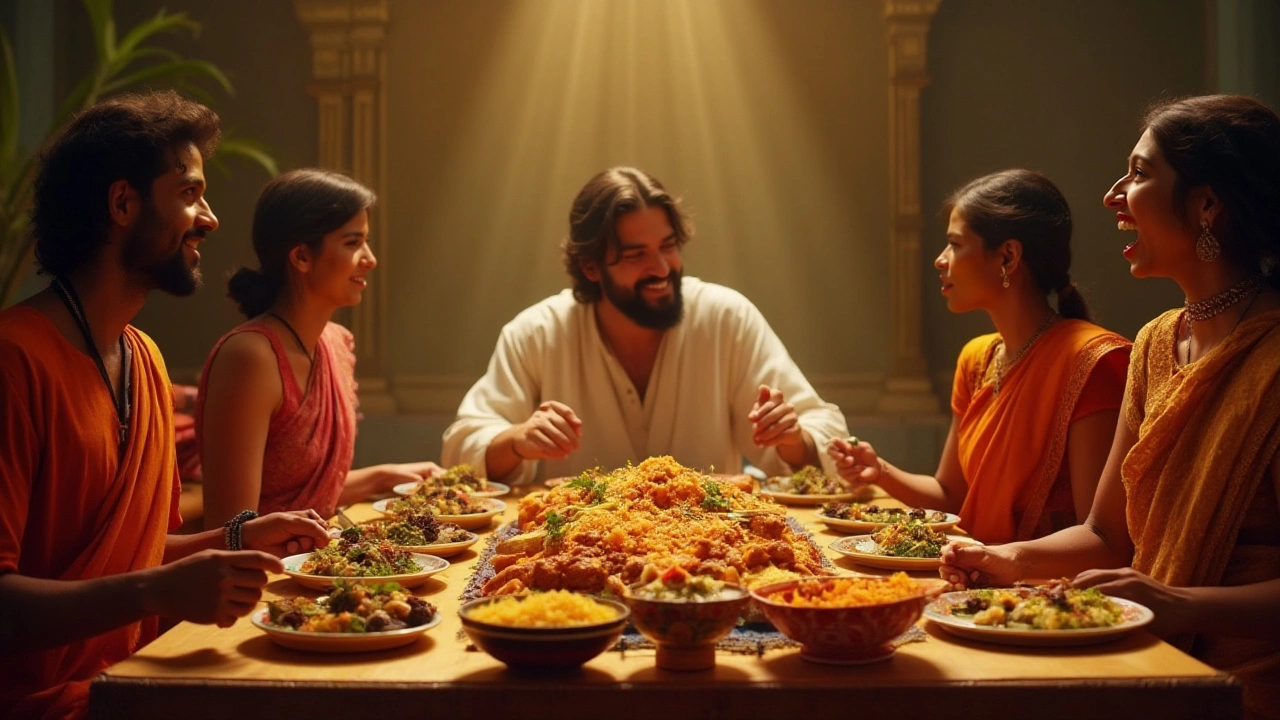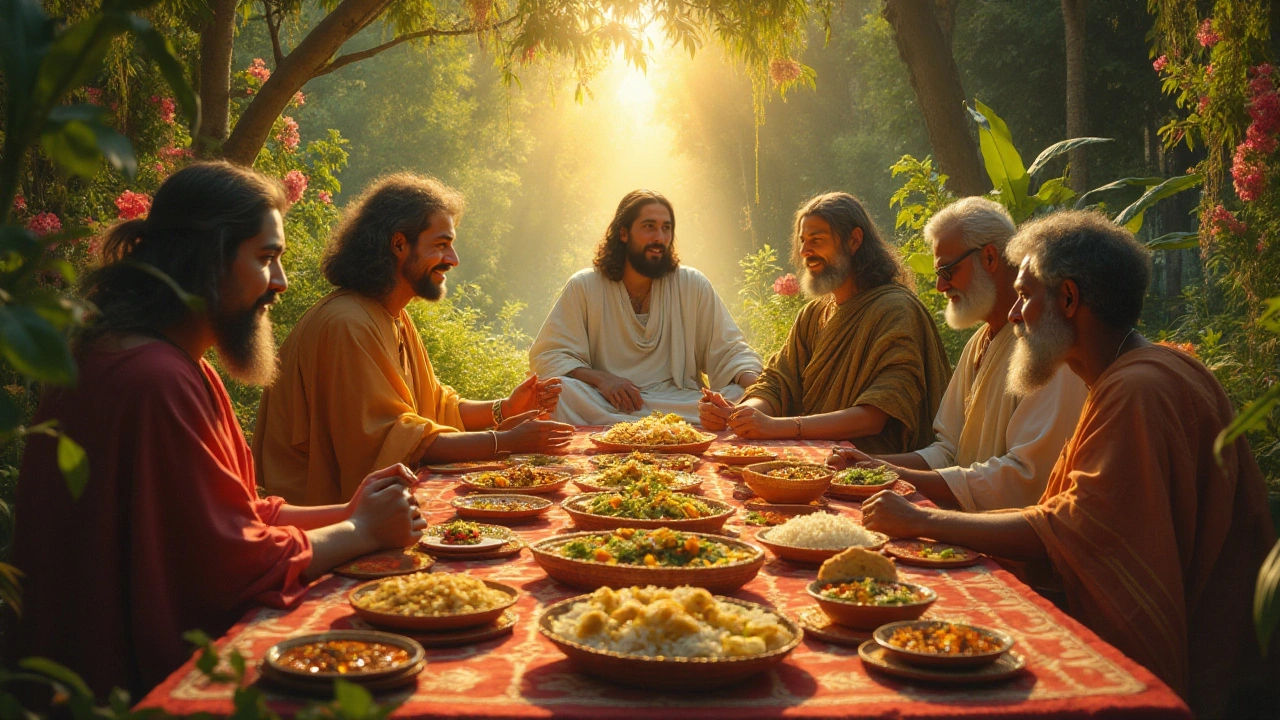The idea of Jesus as a vegetarian is a captivating subject with roots in historical, theological, and cultural studies. While concrete evidence from ancient texts is elusive, it opens a window to explore the food habits of that era. The terrain of biblical texts does not provide explicit proof of a vegetarian lifestyle for Jesus, yet the question remains enticing for many.
Shifting our lens to vegetarianism, this approach to diet finds its advocates across various spiritual traditions, including within the Indian subcontinent's rich tapestry of beliefs. Today, vegetarianism is celebrated for its health benefits and its alignment with spiritual practices. We can draw interesting parallels and enjoy a cross-cultural exploration by sampling vegetarian Indian dishes. These dishes are not just about sustenance but are vibrant expressions of culinary art.
- Historical Context of Jesus' Era
- Biblical References Regarding Diet
- Spirituality and Vegetarianism
- Popular Vegetarian Indian Dishes
Historical Context of Jesus' Era
To understand whether Jesus could have been a vegetarian, it's crucial to examine the cultural and historical backdrop of His time. The 1st century Judea, where Jesus lived, was a melting pot of various traditions and practices, influenced by Roman, Jewish, and Hellenistic cultures. People primarily depended on agriculture, and their diet consisted mainly of bread, olives, figs, and fish. The availability of food items played a significant role in determining the dietary practices of that era. Wealthier families might have enjoyed more varied diets, including meats like lamb during special celebrations or religious festivals.
The Jewish dietary laws, known as kosher laws, shaped the daily meals of many in the region. These laws, rooted in ancient traditions, dictated the types of food that could be consumed and how they were to be prepared. Fish was a common source of protein due to its availability, and it was often smoked or salted for preservation. Meat was less frequently consumed due to the cost and ritual cleansing required. There is some evidence to suggest that certain Jewish sects, like the Essenes, practiced vegetarianism as part of their spiritual discipline.
"Evidence of the simpler diets among some sects does suggest an emphasis on purity and spiritual devotion," notes historian Karen Armstrong in her analysis of early Judean societies.
In Roman-occupied Judea, economic and class distinctions were strong, and diet was often a reflection of this. The majority of the population were peasants and subsisted on simpler means. Grains, legumes, and dairy were the staples for many. Meat, reserved and consumed primarily during the feast days, wasn't as regular a part of the diet due to economic constraints. Over time, these practices even affected religious observances, influencing spiritual and cultural norms of Jesus' community.
Against this backdrop, Jesus' teachings often reflected the rural settings around Him. His parables employed agricultural imagery — the sower, the vineyard, the fig tree — alluding to the everyday life and surroundings of His listeners. His references to meals were not just metaphorical but also reflective of the communal gatherings and nourishment rituals familiar to His audience. These contexts offer insight into understanding His dietary habits.
It is in these historical nuances that the discussion about whether Jesus was a vegetarian gains depth. Although there is no conclusive evidence pointing directly towards a vegetarian lifestyle, the practices and influences of His time allow for speculative exploration, enriching our understanding of early 1st-century Judaic life. As we navigate these historical nuances, the question itself propels us into a deeper exploration of spiritual practices and their ties with dietary choices.

Biblical References Regarding Diet
The diet of Jesus, a subject often shrouded in mystery, draws interest from scholars and laymen alike. The Bible, while replete with stories about miracles and teachings, does not delve explicitly into the dietary preferences of its characters. It offers glimpses, rather, into the broader landscape of food culture during Jesus' time. Accounts in the Gospels suggest that Jesus attended meals and shared food with others, emphasizing the social and communal aspects of dining in those times. This culture was deeply intertwined with the customs of the region, seized by the influences of Jewish laws as well as Roman occupation.
The dietary laws emerging from Jewish tradition played a significant role in shaping the food habits during the biblical era. These laws, laid down in the Torah, revolved around what was deemed clean or unclean, directly influencing a largely agrarian society's approach to food. Meat consumption, for instance, was regulated by kosher laws, which stress the method of slaughter and the types of acceptable animals. While not explicitly stating Jesus' preference for a vegetarian or omnivorous diet, these laws reflect the environment in which he lived. On many occasions, His choice of food and drink carried symbolic meaning, such as the sharing of bread and wine during the Last Supper.
Jesus' relationship with fish, as documented in the Gospels, is particularly notable. He performed the miracle of feeding thousands with loaves and fish, a testament to the staple nature of these foods. Some point to characters in early Christianity who adopted vegetarianism as part of their spiritual practice, seeing it as a path to non-violence and compassion. There is a view held by some scholars that Jesus, like many spiritual leaders throughout history, might have leaned towards ethical dietary practices, including vegetarianism. This notion is debated and not universally agreed upon. The importance of hospitality and sharing food in His teachings underscores a language of inclusivity and love that transcends specific dietary choices.
There are also instances where Jesus speaks of himself metaphorically as the 'bread of life.' Here, the notion of spiritual nourishment eclipses the physical act of eating, pointing perhaps to broader lessons beyond the literal consumption of food.
"Blessed are those who hunger and thirst for righteousness, for they shall be filled" - Matthew 5:6.This verse, while not directly discussing dietary habits, mirrors the emphasis on spiritual fulfillment over material needs. From ancient days, such teachings have resonated across cultures, even as interpretations diverge. Jesus’ approach, often perceived as transcending literal practices, encourages an exploration into how dietary choices may align with ethical and spiritual values today.

Spirituality and Vegetarianism
The intersection of spirituality and vegetarianism is a deep and engaging subject that resonates through time and cultures. Across various religious and philosophical traditions, there’s a recurring theme linking non-violence and mindful eating. In Hinduism, Ahimsa, meaning non-harm, is a critical tenet promoting compassion towards all living beings. This principle naturally extends to dietary choices, advocating against the harm of animals for food. Many Buddhists also adopt vegetarianism, viewing it as a path to reduce suffering and maintain inner peace. It’s fascinating to note that these spiritual practices consistently emphasize the importance of a compassionate diet.
In Christianity, while no explicit directive exists for a vegetarian diet, the broader ethos of love and care does inspire some believers to embrace a vegetarian lifestyle. Historical records reveal that several early Christian sects, like the Ebionites, practiced vegetarianism as a reflection of their commitment to faith and ethical living. It’s intriguing to consider how these interpretations weave a tapestry rich with varying perspectives, each inviting followers to explore how dietary habits might reflect spiritual values. Interconnected choices like these continue to inspire many people to consider vegetarianism as a spiritual expression.
While discussing the question, "Was Jesus a vegetarian?" it’s crucial to understand the symbolic and cultural backdrop of His time. Some connect Jesus' life with Nazirite vows, a biblical tradition involving abstention from certain acts to honor the divine. Although the evidence about His vegetarianism might not be through direct text, these connections sometimes inspire contemporary discussions about spirituality and diet. Moreover, an understanding of communal meals shared and blessed by Jesus, as illustrated in the Gospels, enriches this dialogue. One might ponder how, through shared food, spiritual narratives can form, drawing connections between one's faith and their choice of diet.
"For meat does not commend us to God: neither, if we eat, are we the better; neither, if we eat not, are we the worse." - 1 Corinthians 8:8, reflecting on the freedom of choice within a context of dietary ethics.
Interestingly, vegetarianism is gaining ground beyond religious boundaries today. Many embrace it for health benefits and environmental reasons, seeing it as a way to live in harmony with the planet. The global shift towards vegetarian and vegan lifestyles mirrors a growing awareness of interconnectedness and compassion. This aligns seamlessly with spiritual ideals of well-being and mindfulness. Taking inspiration from these varied traditions, one might consider this lifestyle not just as a diet but as an ongoing commitment to living thoughtfully and taking an ethical stance on consumption.
As the debate continues, there’s an underlying call for respectful living that transcends dietary habits, inviting individuals to reflect consciously on everyday choices. Exploring vegetarianism from a spiritual lens is not about drawing definitive conclusions; instead, it encourages a broader understanding and appreciation of how food choices might echo within the soul's aspirations. Whether you are drawn to the teachings of ancient traditions or modern wellbeing philosophies, there seems to be a common thread emphasizing conscious, compassionate choices that resonate across cultures and eras.

Popular Vegetarian Indian Dishes
The vibrant and diverse world of Indian cuisine offers a feast of flavors, colors, and aromas that are as captivating as they are delicious. In a land where spirituality often intertwines with food, vegetarianism is not just a dietary choice but a way of life for millions. With a variety of ingredients ranging from lentils and legumes to fresh vegetables and aromatic spices, Indian vegetarian dishes are a treasure trove for anyone looking to explore plant-based eating. The vegetarian spectrum in India shouldn't be seen as a limitation, rather it's an invitation to experience a multitude of dishes that delight the senses.
One of the iconic dishes you might encounter is the humble but deeply satisfying Dal Tadka. This dish is made from lentils, usually yellow split peas or skinned black lentils, cooked to a creamy texture. The true magic unfolds when it is enriched with a sizzling tadka—a tempering of spices like cumin, mustard seeds, and garlic sautéed in ghee or oil. Each regional variation adds its own special twist, often adding tomatoes, onions, or a hint of lemon juice to brighten the dish. The depth of flavor is unparalleled, making it a favorite comfort food. Many would argue that if you haven't tried a well-cooked Dal, you haven't truly experienced Indian food.
A close companion to Dal Tadka is the celebrated Paneer Butter Masala, a dish that vegetarian gastronomists across the world adore. Paneer, a fresh cheese, is thickly sliced and cooked in a rich, creamy tomato-based sauce. The origins of this dish lie in North India, especially in Punjabi cuisine, where dairy products are a staple. What sets Paneer Butter Masala apart is the velvety texture achieved through the addition of butter and cream, transforming it into an indulgent treat. This dish is hearty and substantial, typically enjoyed with naan or roti. It leaves an impression that lasts long after the meal is over.
And then there is a dish which speaks to the bounty of vegetables available in the Indian subcontinent: the traditional Vegetable Biryani. This fragrant rice dish is layered with a medley of vegetables that can include potatoes, carrots, beans, and cauliflower. Aromatic spices like saffron, cardamom, and bay leaves weave a tapestry of flavors that elevate this dish from daily fare to something special. Biryani has its roots in Persian cuisine but has evolved with many regional spins across India. Whether you're enjoying it at a family feast or a wedding celebration, Vegetable Biryani is bound to capture your heart and taste buds.
Lastly, one simply cannot talk about Indian vegetarian food without mentioning the beloved dish of Masoor Ki Raita. This refreshing side dish involves a simple mix of yogurt and cooked lentils, typically masoor dal (red lentils). It is then lightly seasoned with roasted cumin powder, mint, and occasionally pomegranate seeds for a pop of freshness. On warm days, Masoor Ki Raita acts as a coolant, balancing out the heat from spicy main courses. A perfect example of how simplicity often leads to the best-tasting dishes, this raita provides a cool contrast to richly flavored curries and spicy snacks.
"Indian food touches the soul—it is a language in itself that speaks through spices and flavors," acclaimed chef Vikram Vij once noted. His words resonate with the experience of many who have had the fortune to dive into the diverse world of Indian dishes—a gastronomic journey like no other.
For those wondering about the appeal of these foods, consider that India's hospitality often revolves around sharing a meal. Cooking and savoring vegetarian Indian dishes becomes an experience beyond mere sustenance. Whether stoking nostalgia or serving as a delicious introduction to plant-based meals, these dishes justify themselves splendidly on any table. Dive in, and let these flavors transport you to a land where vegetarian meals are as revered as they are delectable.
